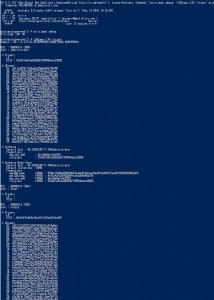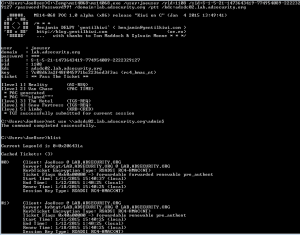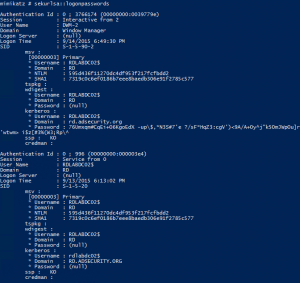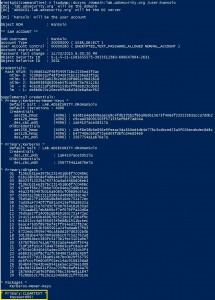In late 2014, I discovered that the domain field in many events in the Windows security event log are not properly populated when forged Kerberos tickets are used. The key indicator is that the domain field is blank or contains the FQDN instead of the short (netbios) name and depending on the tool used to …
Category: Microsoft Security
Jan 03 2016
How Attackers Dump Active Directory Database Credentials
I previously posted some information on dumping AD database credentials before in a couple of posts: “How Attackers Pull the Active Directory Database (NTDS.dit) from a Domain Controller” and “Attack Methods for Gaining Domain Admin Rights in Active Directory“. This post covers many different ways that an attacker can dump credentials from Active Directory, both …
Jan 01 2016
Attack Methods for Gaining Domain Admin Rights in Active Directory
There are many ways an attacker can gain Domain Admin rights in Active Directory. This post is meant to describe some of the more popular ones in current use. The techniques described here “assume breach” where an attacker already has a foothold on an internal system and has gained domain user credentials (aka post-exploitation). The …
Dec 31 2015
Cracking Kerberos TGS Tickets Using Kerberoast – Exploiting Kerberos to Compromise the Active Directory Domain
Microsoft’s Kerberos implementation in Active Directory has been targeted over the past couple of years by security researchers and attackers alike. The issues are primarily related to the legacy support in Kerberos when Active Directory was released in the year 2000 with Windows Server 2000. This legacy support is enabled when using Kerberos RC4 encryption …
Dec 28 2015
Finding Passwords in SYSVOL & Exploiting Group Policy Preferences
At Black Hat and DEF CON this year, I spoke about ways attackers go from Domain User to Domain Admin in modern enterprises. Every Windows computer has a built-in Administrator account with an associated password. Changing this password is a security requirement in most organizations, though the method for doing so is not straight-forward. A …
Dec 14 2015
Unofficial Guide to Mimikatz & Command Reference
A new page on ADSecurity.org just went live which is an “unofficial” guide to Mimikatz which also contains an expansive command reference of all available Mimikatz commands. Screenshots, descriptions, and parameters are included where available and appropriate. This page includes the following topics: Mimikatz Overview Mimikatz & Credentials Available Credentials by OS PowerShell & Mimikatz …
Nov 30 2015
Real-World Example of How Active Directory Can Be Compromised (RSA Conference Presentation)
At the RSA Conference in Abu Dhabi earlier this month, Stefano Maccaglia (Incident Response Consultant with RSA) presented “Evolving Threats: dissection of a Cyber-Espionage attack.” The slides for this talk are available on the RSA Conference site (UPDATE: RSA removed the slides from their site, Presentation Slides on Yumpu). This post covers and adds some …
Nov 22 2015
Dump Clear-Text Passwords for All Admins in the Domain Using Mimikatz DCSync
The two key goals of any attack is access and persistence. This post covers elements of each. In a post-exploitation scenario where the attacker has compromised the domain or an account with delegated rights, it’s possible to dump the clear-text passwords of admins without being a Domain Admin*. This method requires the Active Directory Domain …
Nov 17 2015
How Attackers Use Kerberos Silver Tickets to Exploit Systems
Usually Golden Tickets (forged Kerberos TGTs) get all the press, but this post is about Silver Tickets and how attackers use them to exploit systems. I have talked about how Silver Tickets can be used to persist and even re-exploit an Active Directory enterprise in presentations at security conferences this year. This post continues this …
Oct 14 2015
The Most Common Active Directory Security Issues and What You Can Do to Fix Them
The past couple of years of meeting with customers is enlightening since every environment, though unique, often has the same issues. These issues often boil down to legacy management of the enterprise Microsoft platform going back a decade or more. I spoke about Active Directory attack and defense at several security conferences this year including …







Recent Comments